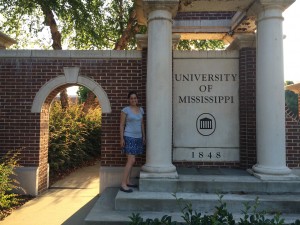Estefanía Aburto Peralta, Universidad La Salle Mexico
Editor’s Note: Estefanía Aburto Peralta participated in the university’s Research Experience for Undergraduates program during summer of 2015. Robert Doerksen, program participant and associate professor of medicinal chemistry, mentored multiple students in the program. Estefanía writes of her experience in this blog post.
My name is Estefanía Aburto Peralta. I’m a fifth-year Mexican student from Universidad La Salle Mexico who was selected for an Intensive English Program and Summer Research Project at the University of Mississippi. For the time I was there (July 22-August 14) I had the chance to work with Manal Nael, one of Dr. Robert Doerksen’s Ph.D. students in the Medicinal Chemistry lab at the School of Pharmacy. I was thrilled with the opportunity because I was getting a chance to enroll for some time in a School of Pharmacy, which meant a lot to me because I’m a chemical pharmaceutical biology student.
The main project I developed with fellow student Ennia Ferreira is called “Docking studies of manzamine A and manzamine 8-OH in the Mycobacterium tuberculosis shikimate kinase.” Mycobacterium tuberculosis is the causative agent for tuberculosis (TB).
Tuberculosis remains a global health problem. Homelessness and the lack of medical care all contribute to the increasing incidence of TB. Usually, the bacteria attack the lungs, but TB bacteria can attack other parts of the body such as the kidney, spine and brain. TB is spread through the air from one person to another. The TB bacteria are put into the air when a person with TB disease of the lungs or throat coughs, sneezes or speaks. People nearby may breathe in these bacteria and become infected.
With the increasing number of TB cases and the increasing number of multidrug-resistant ones, the need for new antitubercular drugs is inevitable. One selective mechanism for tuberculosis is the inhibition of shikimate kinase (SK) in the shikimate pathway. The shikimate pathway is used in bacteria, including M. tuberculosis, for the production of chorismate, a precursor for aromatic amino acids. Mammals do not have the shikimate pathway enzymes necessary for de novo synthesis of these amino acids and therefore obtain them from food. Consequently, inhibitors of SK are selective agents against M. tuberculosis.
TB is a major world health problem, and a lot of patients need new medical treatment. The idea of the project was that by using medicinal chemistry and a process called docking it may be possible to find a molecule (manzamine A and manzamine 8-OH) capable of inhibiting SK and therefore killing the bacteria and stopping the disease. As impressive and interesting as the project seems, it helped me gain a lot of knowledge from different fields, it helped me develop a new way of thinking through medicinal chemistry and overall it helped me understand how medicinal chemistry can improve people’s lives. Indeed the project was a challenge because I was not familiar with the programs and algorithms used, but that made it even more exciting.
I must say that knowledge is not the only thing I gained from this experience. As part of my summer I took a GRE preparation course at the Intensive English Program, which helped me understand how the exam is designed and how we are expected to perform.
But overall, I gained amazing memories and amazing friends for life. I can’t stop thinking about our bike rides to campus, our long walks around campus enjoying the beauty it had to offer, our visits to Sun Studio, Sardis Lake, Rowan Oak, the Mississippi River and Oxford’s Square.
This was an amazing opportunity and I encourage other students to participate in programs like this one.
